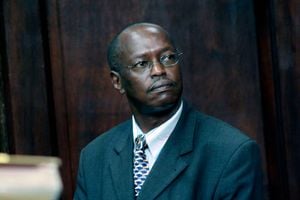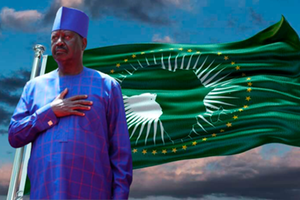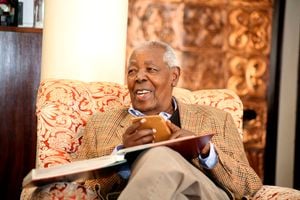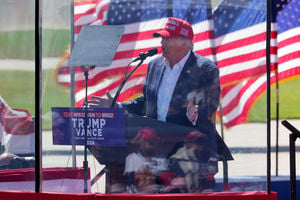
President William Ruto addresses journalists at KICC, Nairobi flanked by his deputy Rigathi Gachagua, Azimio leader Raila Odinga and other national leaders on July 9, 2024.
President William Ruto surprised political pundits when he became the first presidential aspirant, who is not from Central Kenya, to garner more than three percent of votes in Mt Kenya region in the era of multiparty democracy.
Mr Kenneth Matiba, who was from Mt Kenya, contested the presidency in 1992 on a Ford Asili ticket, and shared the spoils with Mr Mwai Kibaki (Democratic Party), also from the Mountain while Mr Daniel arap Moi retained his seat on a Kanu ticket. All the three are now deceased.
Mr Kibaki made a second attempt for the top seat in 1997, but again lost to Mr Moi who beat a divided opposition.
But in the 2002 and 2007 general elections, Mr Kibaki triumphed and bagged majority of the votes in Mt Kenya region.
Political greenhorn Uhuru Kenyatta, whom Mr Moi anointed as his successor, bit the dust in the 2002 General Election. The political gods were on Mr Kenyatta’s side in the 2013 and 2017 polls when he swept to power and collected the Mt Kenya votes almost to a man.
Mt Kenya region
Kenya Kwanza Alliance candidate Dr Ruto was elected President during the 2022 General Election. He bagged 87 percent of the votes in Mt Kenya Region. Mr Kenyatta had snubbed Dr Ruto, the then Deputy President, and picked veteran opposition leader Raila Odinga as his preferred successor. Mr Odinga finished second in his fifth attempt at the presidency on an Azimio la Umoja-One Kenya Coalition Party ticket. Mr Odinga only managed to get 13 percent of the votes in Central Kenya.
Dr Ruto defied the odds to storm to victory, and not even the fact that Mr Kenyatta was the kingpin of Mt Kenya region could stop him.
Dr Ruto’s victory significantly watered down the Kenyatta family’s influence in the politics of the Mountain. The patriarch, Mzee Jomo Kenyatta, was Kenya’s founding president between 1963 and 1978, and his son, Uhuru, followed suit between 2013 and 2022.
Kikuyu Council of Elders partron Kung’u Muigai, who is Mr Kenyatta’s cousin, told Nation.Africa that the main reason why Mt Kenya region defied Mr Kenyatta and refused to back Mr Odinga in the 2022 poll was the fear of a curse following an oath taken in the community in 1969.
Ruto loyalist
Mr Muigai, who is also the Kenya Cultural Council board chairman, and a Ruto loyalist, is unsure whether it will be business as usual in the 2027 General Election when the President will be seeking a second term in office.
This follows a change in the political matrix after Dr Ruto named Mr Odinga’s allies to his administration in the wake of anti-government protests that saw the President decline to assent to the controversial Finance Bill, 2024. On July 11, Dr Ruto sacked all members of his Cabinet except Prime Cabinet Secretary Musalia Mudavadi, who doubles up as the Foreign and Diaspora Affairs on July 11.
Dr Ruto has since named a new Cabinet, bringing back six Cabinet Secretaries he had dismissed and incorporated members of Mr Odinga’s Orange Democratic Movement which has sparked divisions in the opposition ranks. Some top ODM members and the party’s Azimio partners have declined to join the government side. The proposed Cabinet members are awaiting vetting by the National Assembly.
Mass oathing
“The founding father of the Nation Mzee Jomo Kenyatta had on March 12, 1966 kicked out his Vice President, Jaramogi Oginga Odinga, (Raila’s father) from the ruling party Kanu with the help of his Justice and Constitution Minister, Tom Mboya, who was later assassinated in 1969. What followed was commencement of mass oathing in an exercise where I served as a register clerk. A key demand for that oath was to never disintegrate as a community and to never work with the Ogingas in pursuit of the presidency,” Mr Muigai said.
He added; “Culturally, an oath carries a lot of weight and cultural purists ‘treat it with awe to a point where they feel bound to it as though in a covenant with the God…”
“It was massive and was administered to nearly all adults including the clergy. It was uttered in such a way that it bonded us to a lifetime commitment to always reject political projects aimed at rendering our support to the Oginga family.”
Former long-serving administrator Joseph Kaguthi, who worked under the Jomo Kenyatta administration at the time, told Nation.Africa, “this oath, unless it is healed through appeasement to the gods, will remain a common denominator in our politics for years to come since we have never as a community found an alternative to undoing oaths”.
He said that President Ruto did not win Mt Kenya votes because he was the best in the pack, “but rather because he presented the region with the most realistic ticket of escaping the oath from a dead man (Mzee Jomo Kenyatta) who cannot rise and undo the curse threat on those who infringe it”.
Political analyst Prof Ngugi Njoroge said; “Only a fool can ignore the weight the Kenyatta oath carries and its influence on Mt Kenya politics.
Cultural dangers
“It affects generations, and there are cultural dangers with the possibility of a curse. This message is passed down to descendants in the community. This explains why even those who never witnessed first-hand Jaramogi Oginga’s politics and also have never been wronged by Raila Odinga in any way, have continued to hold that family with reservations owing to generational sensitisation,” the don said.
“Even today, children at the grassroots have continued to distance themselves from Raila Odinga, an example being in his 2022 presidential bid when he was 77 years old, yet Mt Kenya voters, some aged below 20, joined their parents in boycotting the opposition leader,” he added.
When former president Uhuru Kenyatta made the announcement that he had settled on Mr Odinga as his preferred successor for the State House job in 2022, Mt Kenya region, led by both community and church elders, defied him.
They reminded members of the community about the 1967 oath, all the way down to the young voters, and this propelled Dr Ruto to victory with Rigathi Gachagua, a son of the soil, as his deputy.
President Ruto pampered Mt Kenya with love. “Mt Kenya has set a precedent in the fight against politics of tribalism whereby the region overwhelmingly voted for me. You have shamed those who have all along thrived on pitting tribe against tribe, deceit and conmanship…you have led by example the journey towards redeeming our body politics from negative ethnicity to nationalism,” he said.
Deputy President Gachagua echoed his boss’ sentiments. He vowed that there would be no “Handshake” between Dr Ruto and Mr Odinga like was the case when the latter buried the hatchet with Mr Kenyatta on March 9, 2018 after a bitterly contested election.
Mr Gachagua said that after the 2022 polls were held, it sent winners to government and the losers to the opposition.
Mr Gachagua went a notch higher and declared that “this is a shareholding government where those who believed in President Ruto’s vision and invested in him through votes must get the cream of opportunities while others who were fighting and working to ensure that he never won get morsels”.
Central Kenya senior leaders led by National Assembly Leader of Majority Kimani Ichung’wah and Kiharu MP Ndindi Nyoro went around Mt Kenya region and preached against any thought that might lead to President Ruto entertaining Mr Odinga, who led street protests against the government after the 2022 polls.
Two years down the line, the youth, mostly Gen-Zs, launched nationwide protests against the Ruto government for over a month now that led to the dropping of the Finance Bill, 2024 and dismissal of the Cabinet. With time, the protesters began pushing for Dr Ruto to vacate State House.
“This is where it gets interesting after it became clear that some of us in Mt Kenya were collaborating with the violent aggressors in a bid to topple the government. The President had to look elsewhere to boost his numbers, and as we speak, Mr Odinga is not only in the government but is controlling the Bottom-Up agenda in President Ruto’s election manifesto,” said Laikipia East Member of Parliament Mwangi Kiunjuri.
Mr Muigai said: “It is not clear how Mt Kenya will react to the move since our people usually take time to read things first before coming up with a binding position. Usually, the position will come from the common mwananchi without the influence of the elected politicians.”
Kikuyu Council of Elders Chairman Wachira Kiago said: “In 2002 when Mr Kibaki won the presidential race we embraced Mr Odinga…It cannot be that when he is helping us win there is no oath to fear but when we are supposed to reciprocate the gesture, the curse is brandished to scare us”.
“Even the supreme God of the Agikuyu stands for peace and unity, where communities come together to live in harmony,” he added.
However, former Kiambu governor Ferdinand Waititu believes that President Ruto’s naming of Mr Odinga’s allies into government is an act of aggression to the Mt Kenya nation “and soon the folly will catch up with him ahead of the 2027 polls”.
Jubilee Secretary-General Jeremiah Kioni, who supported Mr Odinga in his flopped 2022 presidential bid said: “President Ruto is now throwing his last kicks. He is killing political parties and buying off leaders in the false belief that he will continue to wield influence in Mt Kenya and in the country…his dice is cast and we will patiently wait to do the necessary in 2027”.










